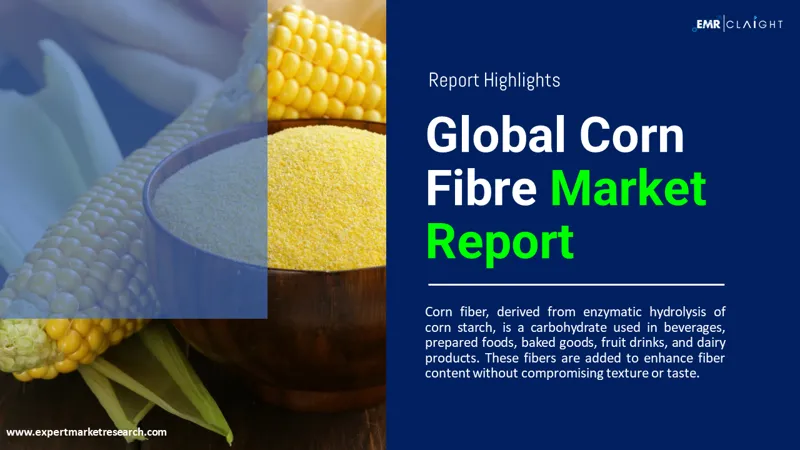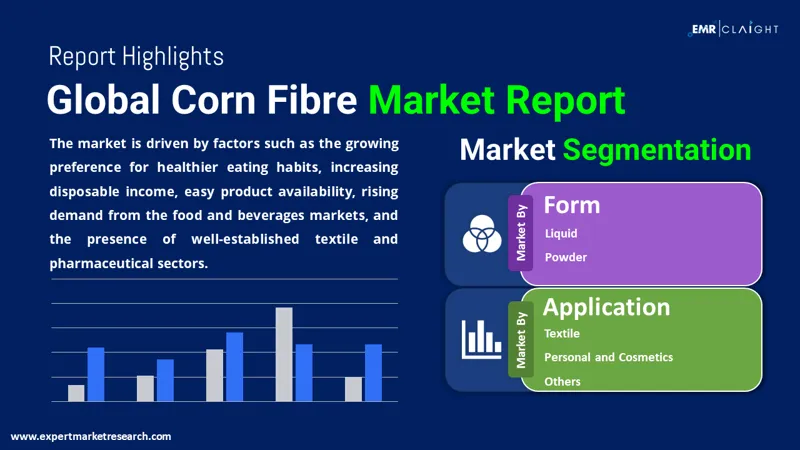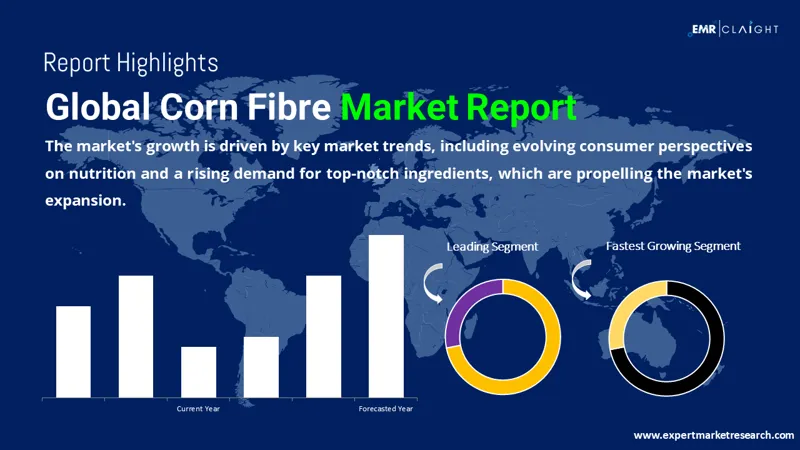
Consumer Insights
Uncover trends and behaviors shaping consumer choices today
Procurement Insights
Optimize your sourcing strategy with key market data
Industry Stats
Stay ahead with the latest trends and market analysis.
The global corn fibre market attained a value of USD 1024.28 Million in 2025. The market is further expected to grow in the forecast period of 2026-2035 at a CAGR of 6.10%, to reach USD 1851.71 Million by 2035.
Base Year
Historical Period
Forecast Period
The United States is the largest producer of corn in the world, accounting for 32% of global production in 2023-24. The top corn-producing states are Iowa (17%), Illinois (15%), Nebraska (12%), Minnesota (10%), and Indiana (7%).
After the US, the other top producers are China (23% of global production), Brazil (11%), the European Union (5%), and Argentina (5%).
Corn is the third largest grain crop in the world after wheat and rice.
Compound Annual Growth Rate
6.1%
Value in USD Million
2026-2035
*this image is indicative*
Corn fibre is a carbohydrate and is produced through enzymatic hydrolysis of corn starch. It is used in various beverages, prepared foods, baked goods, fruit drinks and dairy products. These fibres are generally incorporated to foods to enhance the dietary fibre value without sacrificing on texture and taste. Also, corn fibres are increasingly used in textile applications as they are eco-friendly in nature, provide superior comfort, are stain and heat resistant. It is also used in animal nutrition and cosmetics.
The key drivers aiding the corn fibre market expansion include the increasing demand for foods high in fibre along with the presence of technology developments. However, the market faces challenges due to the presence of substitute products.

Read more about this report - REQUEST FREE SAMPLE COPY IN PDF
Rising demand for high-nutritional products, increasing use of corn fibre in animal nutrition, and innovations in product development are factors leading to corn fibre market development
Corn fibres are increasingly being utilised to supplement the diets of poultry, swine, and ruminants due to their nutritional benefits. Corn fibre-based animal feed products, such as those offered by Cargill and ADM, are gaining popularity among livestock farmers due to their ability to improve digestive health and promote growth in animals.
One significant trend propelling the corn fibre market growth is the rising demand for high-nutritional products. The demand for health and meal replacement drinks, such as Ensure and Boost, is contributing to the growth of corn fibre consumption, especially due to their rich protein and carbohydrate content.
Companies are striving to achieve optimal business growth by developing innovative products that include corn fibres. Ingredion has introduced a range of corn fibre-based ingredients, such as Hi-maize resistant starch and Novelose dietary fibre, which are used in various food and beverage applications to enhance nutritional value and improve texture.
Corn fibre helps in maintaining intestinal health, supporting bone mineralisation, increasing calcium absorption in the body, and has also been linked to a lower risk of heart diseases and some cancers. Therefore, soluble corn fibre is increasingly used by pharmaceutical companies, consequently strengthening the corn fibre market outlook.
Furthermore, changing consumer views on nutrition and increasing demand for high-quality ingredients are likely to favour market growth. A shift towards healthy eating habits and rising disposable income, accompanied by the easy availability of the product, are likely to boost the market.

Read more about this report - REQUEST FREE SAMPLE COPY IN PDF
The EMR’s report titled “Corn Fibre Market Report and Forecast 2026-2035” offers a detailed analysis of the market based on the following segments:
Market Breakup by Form
Market Breakup by Application
Market Breakup by Region
The liquid form segment is expected to experience significant growth, driven by its increasing use in food and beverage applications
The liquid form of corn fibre is a popular choice in various industries due to its versatility and ease of use. It is often used in food and beverage applications, such as in the production of soft drinks, juices, and other liquid products. The liquid form is also used in pharmaceutical applications, where it serves as an excipient or a carrier agent for active pharmaceutical ingredients.
The powder form of corn fibre is widely used in food, pharmaceutical, and textile applications. As per corn fibre market analysis, it is preferred for its ease of storage, transportation, and handling, as well as its ability to be easily incorporated into a variety of products. The powdered form is used in food products to improve texture, increase moisture retention, and extend shelf life. It is also used in pharmaceutical applications, particularly in the production of tablets, capsules, and other solid dosage forms.
The market exhibits significant growth potential across various applications, driven by the increasing awareness of the benefits of corn fibre in different industries
The demand for corn fibre in the food and beverage industry is driven by the increasing consumer preference for natural and healthy ingredients. Corn fibre is used to enhance the nutritional profile of various products, such as dairy items, prepared foods, and baked goods, due to its high nutritional content and functional properties. The rising popularity of health drinks, meal replacement beverages, and products with added fibre content and reduced sugar levels is expected to boost the demand for corn fibre in this segment.
The pharmaceutical application segment is anticipated to hold a large corn fibre market share as corn fibre is being utilised in the production of pharmaceutical products and medicines to enhance their nutritional benefits. Moreover, the use of soluble corn fibres to improve bone strength in post-menopausal women and their effectiveness in chronic disease management, including diabetes, are key factors expected to accelerate the demand for corn fibre in pharmaceutical applications.
In addition, corn fibre fabrics are gaining acceptance in various textile applications, such as non-woven, industrial textile, and home textile products like window coverings and diapers. The increasing consumer demand for sustainable textile materials and the unique properties of corn fibre, such as natural moisture-wicking and antibacterial properties, are driving its popularity in the textile industry, especially in sportswear and activewear.

Read more about this report - REQUEST FREE SAMPLE COPY IN PDF
Market players are focused on increasing their market share by creating new soluble corn fibre formulations aligned with consumer preferences like clean labels and reduced sugar
Archer Daniels Midland Company (ADM) was founded in 1902 and is headquartered in Illinois, United States. The company produces and sells food ingredients, animal feed, and other agricultural products worldwide.
Ingredion Incorporated was founded in 1906 as Corn Products Refining Company and is headquartered in Illinois, United States. The company produces and sells ingredients for food, beverage, animal nutrition, paper and corrugating, brewing, and other industries globally.
Roquette Frères was founded in 1933 and is headquartered in Lestrem, France. The company produces food ingredients, pharmaceutical excipients and other plant-based products for customers worldwide.
Tate & Lyle PLC was founded in 1921 through the merger of Henry Tate & Sons and Abram Lyle & Sons. The company is headquartered in London, United Kingdom and produces food and beverage ingredients, industrial products, and solutions for customers globally.
*Please note that this is only a partial list; the complete list of key players is available in the full report. Additionally, the list of key players can be customized to better suit your needs.*
Other key players in the global corn fibre market include HL Agro Products Pvt. Ltd, among others.
North America's dominance is fuelled by the presence of several pharmaceutical companies and a thriving food and beverage sector
North America has been a significant market for corn fibre in the past and is expected to dominate over the forecast period as well. The region’s growth is driven by well-established textile and pharmaceutical industries. Moreover, rising living standards and changing consumer views on nutrition are some of the major drivers boosting the corn fibre market growth in the region. In addition, industry players are investing in R&D to broaden the customer base, gain brand recognition, and diversify their product portfolio, which is also expected to boost market’s expansion in the region.
The Asia Pacific region is anticipated to attain a significant market share during the forecast period, driven by the presence of key pharmaceutical companies and the expanding food and beverage industry. China, a significant player in the Asia Pacific market, is expected to grow steadily due to its large-scale corn production. The region's textile industry is also expected to provide growth opportunities for the market.




*While we strive to always give you current and accurate information, the numbers depicted on the website are indicative and may differ from the actual numbers in the main report. At Expert Market Research, we aim to bring you the latest insights and trends in the market. Using our analyses and forecasts, stakeholders can understand the market dynamics, navigate challenges, and capitalize on opportunities to make data-driven strategic decisions.*
Get in touch with us for a customized solution tailored to your unique requirements and save upto 35%!
The corn fibre market is expected to grow at a CAGR of 6.10% between 2026 and 2035.
The market is estimated to witness a healthy growth in the forecast period of 2026-2035 to USD 1851.71 billion by 2035.
The major drivers of the market include the shift towards healthy eating habits, rising disposable incomes, easy availability of the product, the rising demand for corn fibre in the food and beverages sector, and the robust growth of the textile and pharmaceutical sectors.
Key trends aiding market expansion include the rising demand for high-quality ingredients among customers and the growing awareness regarding the benefits of corn fibre in supporting bone mineralisation and maintaining intestinal health.
Regions considered in the market are North America, Europe, the Asia Pacific, Latin America, and the Middle East and Africa.
The different forms of corn fibre are liquid and powder.
The major applications of corn fibre are food and beverage, pharmaceuticals, animal nutrition, textile, and personal and cosmetics, among others.
Key players in the market are Archer Daniels Midland Company, Ingredion Incorporated, Roquette Frères, Tate & Lyle Pic, and HL Agro Products Pvt. Ltd, among others.
In 2025, the corn fibre market reached an approximate value of USD 1024.28 Million.
Explore our key highlights of the report and gain a concise overview of key findings, trends, and actionable insights that will empower your strategic decisions.
| REPORT FEATURES | DETAILS |
| Base Year | 2025 |
| Historical Period | 2019-2025 |
| Forecast Period | 2026-2035 |
| Scope of the Report |
Historical and Forecast Trends, Industry Drivers and Constraints, Historical and Forecast Market Analysis by Segment:
|
| Breakup by Form |
|
| Breakup by Application |
|
| Breakup by Region |
|
| Market Dynamics |
|
| Competitive Landscape |
|
| Companies Covered |
|
| Report Price and Purchase Option | Explore our purchase options that are best suited to your resources and industry needs. |
| Delivery Format | Delivered as an attached PDF and Excel through email, with an option of receiving an editable PPT, according to the purchase option. |
Single User License
One User
USD 3,999
USD 3,599
tax inclusive*
Datasheet
One User
USD 2,499
USD 2,249
tax inclusive*
Five User License
Five User
USD 4,999
USD 4,249
tax inclusive*
Corporate License
Unlimited Users
USD 5,999
USD 5,099
tax inclusive*
*Please note that the prices mentioned below are starting prices for each bundle type. Kindly contact our team for further details.*
Flash Bundle
Small Business Bundle
Growth Bundle
Enterprise Bundle
*Please note that the prices mentioned below are starting prices for each bundle type. Kindly contact our team for further details.*
Flash Bundle
Number of Reports: 3
20%
tax inclusive*
Small Business Bundle
Number of Reports: 5
25%
tax inclusive*
Growth Bundle
Number of Reports: 8
30%
tax inclusive*
Enterprise Bundle
Number of Reports: 10
35%
tax inclusive*
How To Order

Select License Type
Choose the right license for your needs and access rights.

Click on ‘Buy Now’
Add the report to your cart with one click and proceed to register.

Select Mode of Payment
Choose a payment option for a secure checkout. You will be redirected accordingly.
Strategic Solutions for Informed Decision-Making
Gain insights to stay ahead and seize opportunities.

Get insights & trends for a competitive edge.

Track prices with detailed trend reports.

Analyse trade data for supply chain insights.

Leverage cost reports for smart savings

Enhance supply chain with partnerships.

Connect For More Information
Our expert team of analysts will offer full support and resolve any queries regarding the report, before and after the purchase.
Our expert team of analysts will offer full support and resolve any queries regarding the report, before and after the purchase.
We employ meticulous research methods, blending advanced analytics and expert insights to deliver accurate, actionable industry intelligence, staying ahead of competitors.
Our skilled analysts offer unparalleled competitive advantage with detailed insights on current and emerging markets, ensuring your strategic edge.
We offer an in-depth yet simplified presentation of industry insights and analysis to meet your specific requirements effectively.
Share